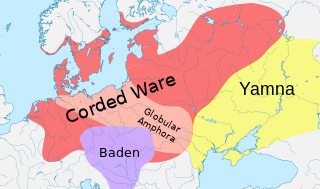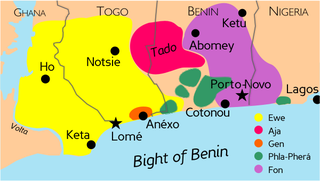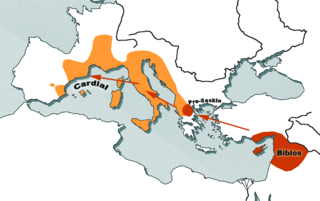
Excalibur, or Caliburn, is the legendary sword of King Arthur, sometimes also attributed with magical powers or associated with the rightful sovereignty of Britain. Excalibur and the Sword in the Stone are sometimes said to be the same weapon, but in most versions they are considered separate. Excalibur was associated with the Arthurian legend very early on. In Welsh, it is called Caledfwlch; in Cornish, Calesvol; in Breton, Kaledvoulc'h; and in Latin, Caliburnus.

In ancient Roman religion,Fontus or Fons was a god of wells and springs. A religious festival called the Fontinalia was held on October 13 in his honor. Throughout the city, fountains and wellheads were adorned with garlands.

The Corded Ware culture, CWC comprises a broad archaeological horizon of Europe between c. 2900 BCE – circa 2350 BCE, thus from the late Neolithic, through the Copper Age, and ending in the early Bronze Age. Corded Ware culture encompassed a vast area, from the Rhine on the west to the Volga in the east, occupying parts of Northern Europe, Central Europe and Eastern Europe.

The Matter of Britain is the body of Medieval literature and legendary material associated with Great Britain and Brittany, and the legendary kings and heroes associated with it, particularly King Arthur. It was one of the three great story cycles recalled repeatedly in medieval literature, together with the Matter of France, which concerned the legends of Charlemagne, and the Matter of Rome, which included material derived from or inspired by classical mythology.
Lancelot was a knight of the mythical Round Table.

Fon is part of the Eastern Gbe language cluster and belongs to the Volta–Niger branch of the Niger–Congo languages. Fon is spoken mainly in Benin by approximately 1.7 million speakers, by the Fon people. Like the other Gbe languages, Fon is an analytic language with an SVO basic word order.
In pragmatics, the origo is the reference point on which deictic relationships are based.

The King of Dahomey was the ruler of the Kingdom of Dahomey, in the southern part of present-day Benin, which lasted from 1600 until 1900 when the French abolished the political authority of the Kingdom. The rulers served a prominent position in Fon ancestor worship leading the Annual Customs and this important position caused the French to bring back the exiled king of Dahomey for ceremonial purposes in 1910. Since 2000, there have been rival claimants as king and there has so far been no political solution. The Palace and seat of government were in the town of Abomey. Early historiography of the King of Dahomey presented them as absolute rulers who formally owned all property and people of the kingdom. However, recent histories have emphasized that there was significant political contestation limiting the power of the king and that there was a female ruler of Dahomey, Hangbe, who was largely written out of early histories.

Cardium pottery or Cardial ware is a Neolithic decorative style that gets its name from the imprinting of the clay with the shell of the cockle, an edible marine mollusk formerly known as Cardium edulis. These forms of pottery are in turn used to define the Neolithic culture which produced and spread them, mostly commonly called the "Cardial culture".
Titus Burckhardt, a German Swiss, was born in Florence, Italy in 1908 and died in Lausanne, Switzerland in 1984. He devoted all his life to the study and exposition of the different aspects of Wisdom tradition.
Lancelot, the Knight of the Cart is a 12th-century Old French poem by Chrétien de Troyes, although it is believed that Chrétien did not complete the text himself. It is one of the first stories of the Arthurian legend to feature Lancelot as a prominent character. The narrative tells about the abduction of Queen Guinevere, and is the first text to feature the love affair between Lancelot and Guinevere.

The Origo Gentis Langobardorum is a short, 7th-century AD Latin account offering a founding myth of the Lombard people. The first part visions the origin and naming of the Lombards, and the following text more resembles a king-list, up until the rule of Perctarit (672–688).
The Origo Gentis Romanae is a short historiographic literary compilation. It narrates the origins of the Roman people. It starts with Saturn and finishes with Romulus. The work was earlier associated with Aurelius Victor, but it is no longer believed to be by his hand.
In Gallo-Roman religion, Divona or, in Gaulish, Devona is the eponymous goddess of a sacred spring that was the source of fresh water (fons) for the city of Burdigala (Bordeaux). She is hailed in a Latin poem by Ausonius, the 4th-century Bordelais scholar-poet who was the tutor of the emperor Gratian.
Sir Elkanah Armitage DL was a British industrialist and Liberal politician.
Anonym[o]us Valesianus is the conventional title of a compilation of two fragmentary vulgar Latin chronicles, named for its 17th-century editor, Henri Valois, or Henricus Valesius (1603–76), who published the text for the first time in 1636, together with his first printed edition of the Res Gestae of Ammianus Marcellinus. It took almost another fifty years when his brother Hadrian re-edited the work of Anonymus in the edition of Ammianus Marcellinus in 1681. It was the first time when Excerpta Valesiana, that is the edition of the Pars Posterior was clearly separated from other fragments.

The Lympha is an ancient Roman deity of fresh water. She is one of twelve agricultural deities listed by Varro as "leaders" (duces) of Roman farmers, because "without water all agriculture is dry and poor." The Lymphae are often connected to Fons, meaning "Source" or "Font," a god of fountains and wellheads. Lympha represents a "functional focus" of fresh water, according to Michael Lipka's conceptual approach to Roman deity, or more generally moisture.
The Chronicon Gothanum or Historia langobardorum codicis gothani (HLCGoth.) is a history of the Lombard people written at and for the court of King Pippin of Italy between the years 806 and 810. It is preserved in one twelfth-century codex, Forschungsbibliothek 84 at Gotha, from which it gets its Latin names. The text is ideologically pro-Carolingian, and among its sources are Isidore of Seville and possibly Jerome.

Grilstone in the parish of Bishop's Nympton in north Devon, England, is an historic estate. The present grade II listed house, situated about 1 1/4 miles south-east of the market town of South Molton, is Georgian, an 1834 extension and remodelling by Rev. William Thorne of an earlier building.
Collected Works. "I seem to be the fons et origo of all the evil imputed to the [Indian] Congress." (1943) Quoted in Gandhi and Churchill by Arthur Herman, (2008) Bantam Dell, NY, NY












